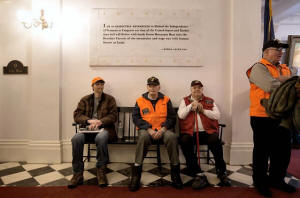|
After Florida massacre, pockets of NRA
country weigh gun law reform
 Send a link to a friend
Send a link to a friend
 [March 22, 2018]
By Christine Muschi [March 22, 2018]
By Christine Muschi
MONTPELIER, Vt. (Reuters) - Vermont, a
mostly rural New England state with a passion for hunting, has a
reputation as a pro-gun stronghold, but the rising specter of school gun
violence has shaken that longstanding political tradition.
The state is one of two dozen where efforts to curb gun violence have
gained new momentum since the Feb. 14 shooting rampage that killed 17
people at Marjory Stoneman Douglas High School in Parkland, Florida, gun
control advocates say.
Governor Phil Scott, reacting to the Florida massacre, and the arrest
days later of a teenager accused of threatening a similar attack in
Vermont, said he was "jolted" into a new willingness to consider
limiting access to guns "by those who shouldn't have them."
He has since embraced bills that would raise the legal age for all
firearms purchases to 21, bolster background checks and make it easier
for police to seize weapons from people deemed to pose an "extreme risk"
of violence.
It was a remarkable turnabout for a Republican governor with a 93
percent approval rating from the National Rifle Association (NRA) gun
rights advocacy group in an otherwise politically liberal state with
some of America's most permissive gun laws.

Gun control advocates say the turnaround in Vermont and other states has
been propelled in part by the groundswell of student-led lobbying
efforts and protests calling for tighter firearms restrictions.
Nevertheless, it remains doubtful whether the flurry of gun-safety
measures in statehouses will translate into new laws.
Politicians in many states remain adamantly opposed to any limits on gun
sales. And legislative control held by the NRA-aligned Republican Party
in 32 states clouds prospects for passing such measures.
"You still have an uphill battle in terms of a comprehensive approach to
fix this problem in many states," said Kristin Brown, co-president of
the Brady Campaign to Prevent Gun Violence. Notably, proposals to ban
assault-style weapons have continued to languish.
Even so, Brown said she would be surprised if more than a few states
failed to at least seriously consider some version of the so-called
"extreme risk" legislation enacted in Florida earlier this month and now
pending in Vermont.
Such measures, allowing police to petition a court to seize firearms of
someone judged a danger to themselves or others, has garnered
considerable bipartisan support, even in some states traditionally
regarded as NRA strongholds, Brown said.
The changing climate at the state level, despite U.S. congressional
paralysis on the issue, in part reflects a shift in growing public
support for new gun restrictions.
A Reuters/Ipsos poll this month found that the proportion of adults who
want to mandatory background checks on prospective buyers at gun shows
and private sales climbed to 87 percent, up from 82 percent in a similar
poll in March 2013.
'GUNSHINE STATE' SETS EXAMPLE
Gun control advocates hope some states will be more inclined to follow
the example of Florida, whose firearms-friendly history earned it the
label of "Gunshine State."
[to top of second column]
|

A group of men wait inside the Vermont State Legislature for the
annual Sportsmen's Legislative Mixer in Montpelier, Vermont, U.S.,
March 13, 2018. REUTERS/Christinne Muschi/File Photo

Spurred by an extraordinary lobbying campaign from survivors of the
Parkland massacre, Florida's GOP-controlled legislature swiftly
passed a bill signed into law by another Republican with strong NRA
credentials - Governor Rick Scott.
Key provisions resemble measures that have gained traction in
Vermont and other states.
They include the extreme-risk proposals; raising the legal minimum
age to buy rifles and shotguns from 18 to 21 (as federal law already
requires for purchasing handguns); and expanded background checks.
Extreme-risk bills are pending in about 24 states, five of them -
Alabama, Kentucky, Pennsylvania, Rhode Island and Utah - where they
were introduced after Parkland, Brown said.
About half a dozen states are considering background check bills,
some to close loopholes for sales at gun shows, and 11 states have
bills pending to ban "bump stocks," which enable semiautomatic
weapons to be fired virtually as automatic machine-guns, Brown said.
Several states have taken a different tack, considering legislation
to allow more guns in classrooms - an idea endorsed by the NRA and
U.S. President Donald Trump.
A majority of Americans, including Republicans, Democrats and gun
owners want stricter laws on gun ownership and armed guards in
schools, according to a Reuters/Ipsos national poll taken in early
March. [nL8N1R35PZ]
Florida's new gun law allows some school personnel to carry guns
where individual school districts permit it but excludes most
teachers from being armed.

At least six more states are weighing similar measures - Kentucky,
Louisiana, Missouri, Oklahoma and South Carolina, according to the
National Conference of State Legislatures.
In Vermont, renowned for its maple syrup, covered bridges and Ben &
Jerry's Ice Cream, the outcome of gun legislation remains uncertain,
even though Democrats control both legislative bodies, with a
smattering of independent and Progressive Party lawmakers.
"The governor's shift on this position changed the landscape," Evan
Hughes, vice president of the NRA-affiliated Vermont Federation of
Sportsmen's Clubs, told Reuters. "And I'm certain that he's hearing
from our community that they're displeased."
(Reporting by Christine Muschi; Additional reporting by Bernie
Woodall in Fort Lauderdale, Fla.; Writing and additional reporting
by Steve Gorman in Los Angeles; Editing by Frank McGurty and Grant
McCool)
[© 2018 Thomson Reuters. All rights
reserved.]
Copyright 2018 Reuters. All rights reserved. This material may not be published,
broadcast, rewritten or redistributed.
Thompson Reuters is solely responsible for this content. |